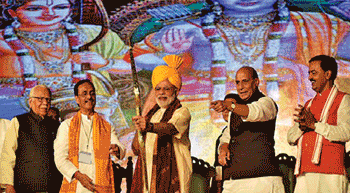The development of Smart Cities across the country needs not just adequate funding, it also requires various state governments to actively get into the act.
Mid-week, on the December 22, 2016 morning the radio channels blared out a slew of infrastructure projects the Devendra Fadnavis government in Maharashtra would be inaugurating at the hands of India’s Prime Minister Narendra Modi, a couple of days later.
The Metro 2B and 4 projects and the proposed elevated corridor between Bandra and Virar would be inaugurated before the code of conduct comes into force for the forthcoming civic body elections not only in Mumbai, but also in 10 mega municipal bodies in Maharasthra, including Pimpri-Chinchwad, Amravati.
However, Bihar chief minsiter Nitish Kumar is not as enthused about the infrastructure plans, and the smart cities concept being ushered in by Modi. He feels that Rs 500 crore will be spread thin over five years will not be nearly enough to smarten up the developmentally challenged cities in India.
Kumar says he will instead focus upon smartening up the rural hinterland (read villages) so that people from rural Bihar do not feel the need to migrate to urban Bihar or other cities, now smartening, in India. The Bihar CM is both right and wrong. Right because for a city to become truly smart, ten times the amount of Rs 500 crore would be a prerequisite.
But Kumar is wrong, because he has really missed the point, as Rs 500 crore is only the seed funding.
Says Dr Sumit D Chowdhury, head of GAIA Smart Cities, ‘The Rs 500 crore is merely seed funding by the Union government to start up the smartening of identified cities in India. This sum, equally matched by the state government (another Rs 500 crore), has to be monetised by the respective states to raise Rs 5,000 crore. With Rs 1,000 crore already available, it is as simple as that to raise the remaining quantum of funds for state governments that would back up the finances so raised, with a state government backing (read guarantee) making the investment risk free.’
However, Kumar is only indulging in political rhetoric, after Patna was kept out of the finalised list of 98 Smart Cities announced by the Union government. Kumar says he’d rather smarten up Bihar’s villages, but even for that purpose, he will certainly need financing.
Kumar probably felt some angst after Patna was left out of the Smart Cities list by the Centre. This was done on account of bad sewage (dearth of public latrines), unhygienic standards maintained in the capital city of Bihar on aspects of cleanliness, and an abject failure to ramp up e-governance parameters.
All three components are essential prerequisites for any city aspiring to be incubated under the national initiative on Smart Cities being propounded by the Union government.
To make matters worse, state government officials and the Patna Municipal Corporation mayor were engaged in a public spat that led to the cleanliness drive veering off course into a slanging bout that got messy.
The aspiring cities needed to usher in reforms to be considered positively and selected under the Union government’s umbrella of the Smart Cities Mission. Bihar did not and paid the price, while three other cities in the state – Biharsharif, Bhagalpur and Muzaffarpur – qualified for the smartening plan.
This game plan to smarten up Indian urban centres is aimed at improving the basic quality and standard of life for citizens with an eye on infrastructural development across the country.
Maharashtra’s Chief Minister Devendra Fadnavis says the Smart Cities – so designated through a collective emphasis upon progressive urban centres ù would also mean seamless connectivity.
Once Mumbai has transformed into a Smart City, Fadnavis says, ‘It would be as simple as a person booking a single ticket at Colaba Metro station to cover his entire journey across the city irrespective of whether he needs to switch his transportation mode from Metro to monorail, to railway or the Brihan-mumbai Electricity Supply and Transport (BEST) bus services.’
Fadnavis, while banking on the infrastructural push that the Smart Cities identified in his state of Maharashtra would become eligible for, is also pursuing fast-paced development by providing a single-window clearance mechanism to speed up civic and state government clearances needed to propel crucial public interest projects.
Complementing the Union government’s emphasis on infrastructure, the Maharashtra CM went a step ahead to ensure fast-paced timelines are maintained. When delayed permissions for infra major Larsen and Toubro from the Brihanmumbai Municipal Corporation (BMC) threatened to stymie his pet project of the installation of close circuit television cameras (CCTVs) across Mumbai city, Fadnavis simplified the process.
Knowing fully well that the Shiv Sena, his alliance partner in the BMC that rules the roost in the civic corporation, may be pointedly seeking to delay the project by withholding permissions sought by L&T for digging up roads, the CM ordered that all permissions sought by the infra major that were pending BMC approval would be deemed as issued beyond two weeks of the application by L&T.
While Nitish Kumar hems and haws, Devendra Fadnavis has moved in right earnest on the flagship schemes announced by the Union government. While this may be the nature of politics in our country, it may also be detrimental to its infrastructural development in the coming years.



Leave a Reply
You must be logged in to post a comment.